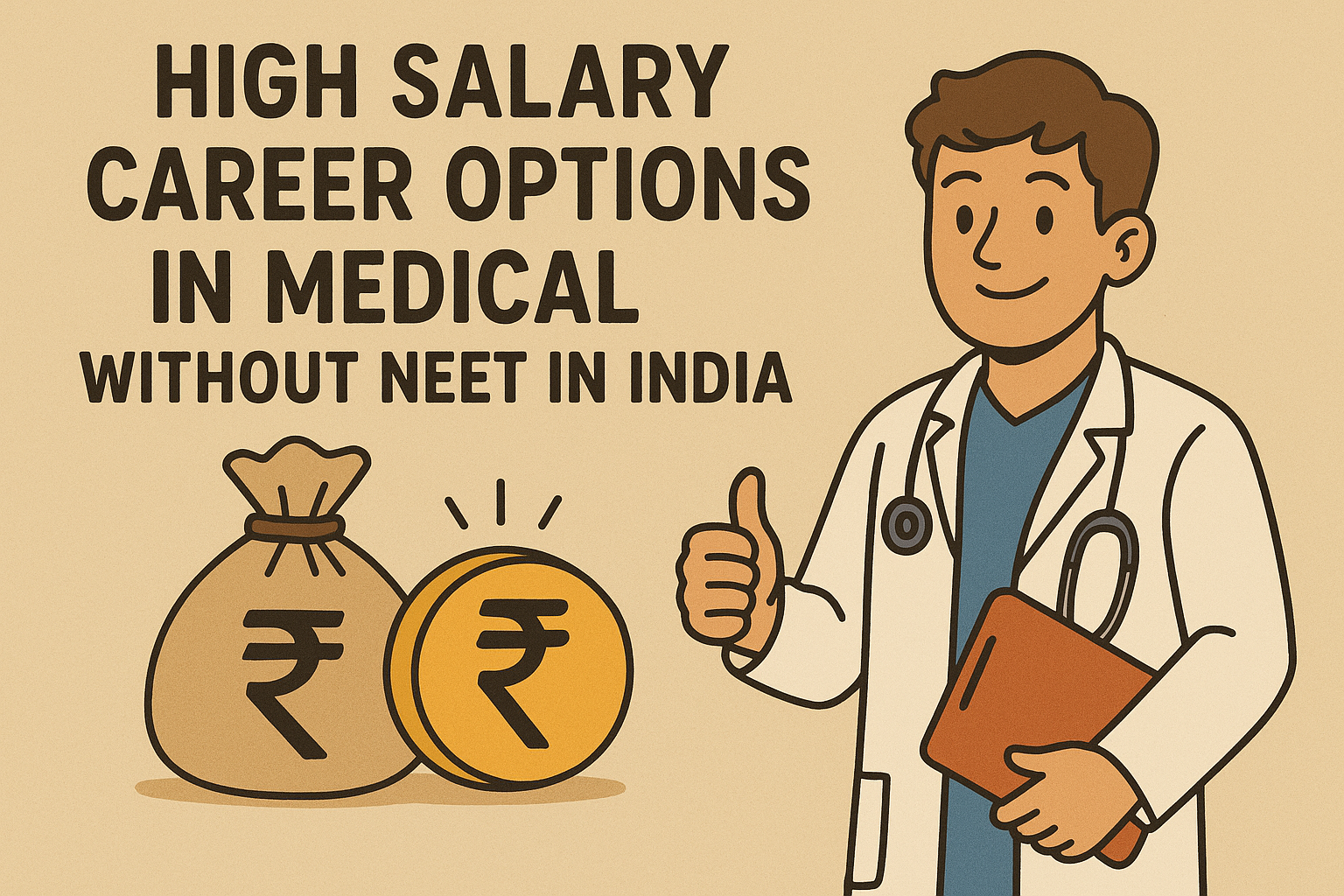Medical Courses
You can pursue various Medical Courses without NEET. Non NEET medical courses offer specialized training and teaching in fields like nursing, medical laboratory technology and physiotherapy. Benefits of Non NEET medical courses include:
- Flexible entry
- Specialized training
- Job security
- High earning potential
- Global opportunities
- Diverse career paths
To prepare for non-NEET medical courses, focus on meeting eligibility criteria like passing Class 12 with a minimum percentage in Physics, Chemistry, and Biology (PCB). The steps include:
- Meet the basic eligibility criteria such as complete 12th grade with a minimum passing percentage, focus on science related subjects such as PCB.
- Research and prepare for admissions, entrance exams and other exams.
- Choose a relevant course and consider a wide variety of options.
Healthcare Jobs
Non-NEET Healthcare Jobs offer a wide range of options including nursing, physiotherapy, pharmacy and medical laboratory technology. These careers involve specialized training and can lead to roles such as registered nurse, clinical physiotherapist, pharmacist, and lab technician, with opportunities in diagnostics, hospitals, and research. To apply for Non-NEET medical courses you must first complete an undergraduate degree in a related field like B.Sc. Nursing, B.Pharm, or B.Sc. in Medical Laboratory Technology. After securing your degree, apply for jobs through hospital or clinic portals, or professional networking sites like LinkedIn. The steps include:
- Enroll in a relevant program
- Check eligibility and prepare for the entrance exam.
- Gain experience and skills through internships and certifications.
- Apply for jobs, create resumes and search for job openings.
High Salary Jobs
A high salary job in medical without NEET includes various specialized fields such in allied health, life sciences and hospital administration. Aspects to consider for a high paying career include:
- Pursuing a Master's degree in specialized fields like clinical research and hospital administration.
- Gain experience and certifications.
- Industries like biotechnology, clinical research, and medical technology are experiencing rapid growth in India, creating abundant high-paying opportunities.
| Career option | Average Salary |
|---|---|
| Medical coder | ₹1 – 5 LPA |
| Physiotherapists | ₹1 – 6 LPA |
| Medical laboratory technician | ₹1 – 5 LPA |
| Radiologic technician | ₹1 – 8 LPA |
| Pharmacist | ₹1 – 4 LPA |
| Dental Hygienist | ₹1 – 5 LPA |
| Nutritionist/Dietitian | ₹2– 6 LPA |
| Optometrist | ₹1 – 4.8 LPA |
| Veterinary Technician | ₹2 – 5 LPA |
| Health Insurance Agent | ₹1 – 4 LPA |
| Medical Transcriptionist | ₹1 – 5 LPA |
| Speech-Language Pathologist | ₹1 – 6.4 LPA |
| Occupational Therapist | ₹1 – 8 LPA |
| Medical Sales Representative | ₹1 – 5 LPA |
Paramedical Jobs
Paramedical Jobs are roles in healthcare that support physicians, including positions like medical lab technologists, radiology technicians, and emergency medical technicians. Other paramedical roles include respiratory therapists, dialysis technicians, and medical scribes, with opportunities in hospitals, diagnostic labs, and imaging centers.
Where to Find Paramedical Jobs:
- Hospitals and clinics, both public and private hospitals.
- Diagnostic and imaging centers
- Websites like Indeed, LinkedIn, Foundit.in, Nakuri.com and more.
- Look for specific government job portals for paramedical vacancies in public health services.
Bsc Medical
A B.Sc. Medicine is an undergraduate degree focused on the study of human health and biology, with various specializations like B.Sc. Medical Lab Technology or B.Sc. Medical Sciences. These programs last for typically 3 to 4 years, covering topics like human physiology, biochemistry and anatomy.
Medical Science and Field
Medical Science is the study of human health diseases, and how to treat, diagnose and prevent illness. It provides career opportunities like:
- Medical research
- Healthcare sector
- Laboratories
- Pharmaceutical industry
The medical field is a broad and diverse sector that involves the care and prevention of illness to prevent and restore health through a wide range of professions and services. Key roles include:
- Physicians
- Nursing
- Therapists
- Pharmacists
- Diagnostic and technical roles
- Support and administrative roles
Pharmacy and Nursing Courses
There are various pharmacy courses available at different levels including diplomas and Bachelor's degree. Common pharmacy programs are the two-year Diploma in Pharmacy (D.Pharm) and the four-year Bachelor of Pharmacy (B.Pharm), with other options like the six-year Doctor of Pharmacy (Pharm. D) and master's degrees also available.
Nursing Courses prepare students for careers in healthcare by teaching them how to provide patient care. A nursing course is an educational program that trains individuals to become healthcare professionals focused on patient care, health promotion, and disease prevention. Programs vary in level, from diplomas like the 2-year ANM course and 3-year GNM course, to undergraduate degrees like the 4-year B.Sc. Nursing.
Radiology
Radiology is the medical specialty that uses medical imaging to diagnose diseases and guide treatment within the bodies of humans and other animals. It began with radiography, but today it includes all imaging modalities.
The requirements to become an radiologist include:
- Passing the necessary medical licensing exam.
- Preparing for the entrance exam.
- Specialty training such as X-ray l, CT's and MRI's.
Medical Lab
A medical lab, or clinical laboratory, is a healthcare facility that analyzes biological samples like blood and urine to help diagnose, treat, and prevent disease.
FAQ'S
Q1. Can you pursue a career in the medical field without NEET?
Ans. Yes, you can pursue a career in the medical field without NEET, by opting various alternative courses like nursing, physiotherapy, pharmacy and more.
Q2. What do you mean by Physiotherapy?
Ans. Physiotherapy is a healthcare profession that focuses on restoring movement and physical function to those with injuries, illnesses, or disabilities. It uses a range of methods, including exercise, manual therapy (like massage), and physical modalities (like heat, cold, or electrical stimulation), to relieve pain, improve mobility, and prevent further injury.
Q3. Is a high salary possible in these non-NEET fields?
Ans. Yes, a high salary is possible in non-NEET fields and can be achieved through focusing on specialization, experience and private practice.
Q4. What is the basic eligibility for most of these courses?
Ans. The basic eligibility for most undergraduate courses (B.Sc., BPT, B.Pharm, etc.) is completion of 10+2 (or equivalent) with Physics, Chemistry, and Biology (PCB), generally with a minimum aggregate of 45% to 50%.
**

